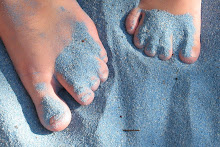In 1890, the U.S. Board on Geographic Names was created to maintain uniform geographic name usage throughout the Federal Government. This Board has been a busy little Board and one not afraid of controversy. For example, it determined that all cities ending in "burgh" should drop the final "h." Protests arose, and at least one city -- Pittsburgh -- got to keep its "h" at the end. (Really, things just wouldn't be right without that last "h.")
The Board also spends time discouraging the use of a possessive form with an apostrophe and an "s." For example, we have Pikes Peak instead of Pike's Peak. However, on rare occasions, the apostrophe is permitted to survive. According to the Board's website:
Since 1890, only five Board decisions have allowed the genitive apostrophe for natural features. These are: Martha's Vineyard (1933) after an extensive local campaign; Ike's Point in New Jersey (1944) because “it would be unrecognizable otherwise”; John E's Pond in Rhode Island (1963) because otherwise it would be confused as John S Pond (note the lack of the use of a period, which is also discouraged); and Carlos Elmer's Joshua View (1995 at the specific request of the Arizona State Board on Geographic and Historic Names because, “otherwise three apparently given names in succession would dilute the meaning,” that is, Joshua refers to a stand of trees. Clark’s Mountain in Oregon (2002) was approved at the request of the Oregon Board to correspond with the personal references of Lewis and Clark.
The bottom line is that the federal government spends more time on naming things than expectant parents. However, they are subject to lobbying (see the Pittsburgh and Martha's Vineyard lessons).
Things can be renamed too. There's a process to propose a name change or a new name.
So, what do you think the odds are that they'll rename the town I was born in after me? (Yeah, don't worry. I'm not holding my breath.)
Monday, June 14, 2010
Subscribe to:
Post Comments (Atom)

No comments:
Post a Comment